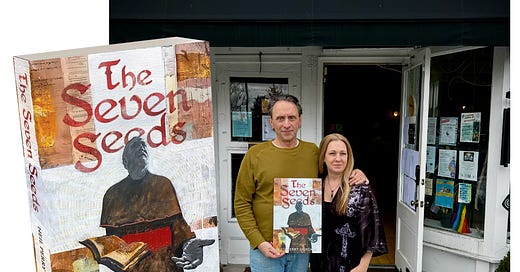What if Christ Never Walked the Earth, and Rome Never Fell?
THE SEVEN SEEDS BOOK LAUNCH AT MODERN DRUID
Reader Review
”I’ve read plenty of alternate history, but The Seven Seeds: Shepherd of Souls felt different—bold, unsettling, and unexpectedly moving. Imagine a Rome that never fell, where myths rule instead of faith, and Pope Gregory is thrust into a world where his beliefs hold no weight. Watching him struggle to plant the seeds of compassion and justice in an empire built on power made me question how deeply our values are shaped by history. It’s not just a “what if” story—it’s a challenge to consider what truly defines civilization. Thought-provoking and immersive, this book stayed with me long after I turned the last page.”
Reader Review
“This book completely blew me away; I mean, an alternate history where Rome never fell and Christianity never existed? Absolutely fascinating; every page had me hooked. Gregory’s journey through this brutal, god-ruled world was intense and emotional and so well-written that I felt like I was right there with him, feeling every moment. The Seven Seeds, these virtues that could reshape an entire empire, added such depth to the story and the stakes felt so real, I couldn’t stop reading because every twist kept me guessing and every challenge felt massive, making this a vivid and unforgettable read that I won’t forget anytime soon!”
Reader Review
“…For anyone who loves stories that blend fantasy with meaningful philosophical questions, The Seven Seeds: Shepherd of Souls is a perfect pick. It's more than just a book; it’s an immersive experience that challenges the very nature of destiny and morality. This novel captured my imagination and left me pondering the impact of virtues in our world.”
Seven Quotes from The Seven Seeds
The Seven Seeds is a powerful narrative that delves deeply into the virtues that sustain and enrich the human spirit. Through its exploration of compassion, humility, forgiveness, justice, wisdom, courage, and sacrifice, the novel offers timeless insights that resonate with readers. It reminds us of the essential qualities that bind and guide us toward greater understanding and unity. Below are quotes from the novel, each reflecting one of these profound virtues. They invite contemplation and inspire reflection on how we can embody these ideals.
Compassion
“Compassion is not a sign of weakness; it is the foundation of a heart willing to heal and restore. [...] True strength is in lifting those who have fallen, binding humanity together.”
Humility
“True humility is recognizing who we are—fallible, finite, and interwoven with one another. It is the acknowledgment that none among us is self-sufficient, that we all depend on forces beyond ourselves.”
Forgiveness
“Forgiveness is not for them. It is for us. To forgive is to free ourselves from the chains of hatred and bitterness. Only then can we truly be free, no matter where we are.”
Justice
“True justice does not shatter chains—it renders them meaningless. It begins with truth: the truth that your life, your voice, and your spirit matter. [...] Justice serves the world, but forgiveness heals the soul.”
Wisdom
“Humility is not submission or weakness but the wisdom to understand our place in the vastness of creation. [...] Pride builds walls, but humility opens windows to the infinite.”
Courage
“Mercy and compassion are not weaknesses. They require courage—the courage to see another’s pain, to recognize their humanity, and to act, even when it costs us something.”
Sacrifice
“Sacrifice is not about what we lose—it is about what we give. It is offering oneself for something greater, a willingness to bear burdens for the hope of renewal.”
For as long as humanity has pondered its existence, we’ve debated a fundamental question: Are we following a predestined path or simply navigating the ripples of our own choices? Is there such a thing as fate, or is destiny merely the sum of intended and unintended consequences?
We like to believe in fate because it offers a sense of order. If everything is preordained, no matter how chaotic life feels, we are still moving toward an inevitable destination. It provides comfort—the idea that what is meant to be will be. Myths, religions, and ancient philosophies reinforce this, painting a world where the gods, the universe, or karma have already determined our outcomes.
But what if fate is just a story we tell ourselves to make sense of consequences we never saw coming?










